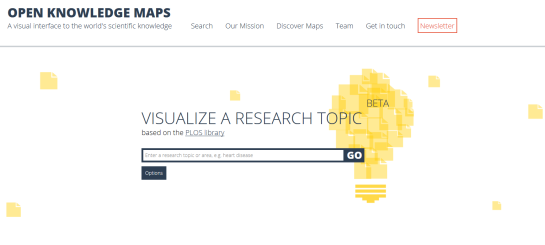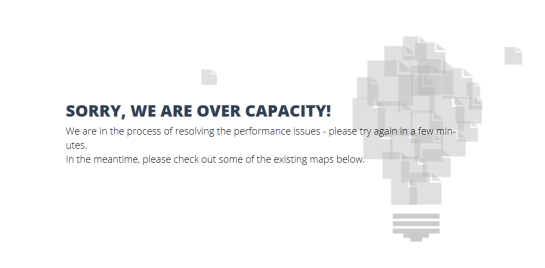The incredible launch of Open Knowledge Maps
We officially announced the launch of Open Knowledge Maps, the visual interface to the world’s scientific knowledge, with a tweet and a message to our advisors late on May 11. We had soft-launched the site more than a week before that, and a bare-bones version of the PLOS visualization service had been online since Mozfest. The website was already getting some attention, and people were using the service on a daily basis. One of the highlights was a feature on Storybench in the very early days of the project. The idea behind the announcement was to get broader feedback on the search service and the overall idea behind Open Knowledge Maps. We had come a long way since the Mozfest days, and we thought that the website was ready for a wider audience.
What was to follow though went far beyond my highest expectations. Over the next 48 hours, we saw more than 350,000 hits on openknowledgemaps.org, generated by 12,000 visitors from all over the world.
What had happened? On the morning of the next day (May 12), I noticed that the tweet had gained a lot of traction, which had translated to acitivity on the site. Lots of people were using the search service, and a new map was created every few seconds. Much to our delight, the feedback was overwhelmingly positive. We started filing all the reactions as many of them contained useful pointers for future improvements. At this point, our server was still humming along fine. Granted, you had to wait a few extra seconds on the search here and there, but nothing out of the ordinary.
During the day, news about Open Knowledge Maps spread to other channels, and at some point around noon CEST, we hit the front page of Hacker News. I immediately noticed a spike in all our parameters. We went from a map every few seconds to multiple maps being created each second. Search time began to rise and we started receive complaints about failed or endless searches. Around 3:30 pm, our server finally gave in. Hundreds of searches were running at the same time, each of them taking minutes to be processed. It was time to take the search service offline and to post our version of the “Fail Whale”. You can still find a version of this screen here.
While we frantically rewrote the search service to handle a larger amount of requests (it was back a mere 60 minutes later), the stream of positive feedback continued to roll in. Up until today, Open Knowledge Maps was mentioned in over 100 tweets, with the announcement tweet creating more than 22,000 impressions alone. You can find a collection of my favourite tweets in this collection. But it was not just Twitter – the news was shared on Facebook, blogs, and in discussion forums.
At one point, we were called “the Wikipedia of scientific knowledge”. It is clear that we still have to go a long way to really deserve this tagline, but it is encouraging that people see the potential of the idea. Needless to say, the positive feedback also sparked the ambition of the Open Knowledge Maps team of volunteers. We are currently busy improving the site and the service; the first results will be available in just a few weeks.
It was a fascinating day in the eye of the storm. I’d like to thank my awesome team for their outstanding work and our great advisors for their help in shaping Open Knowledge Maps. And I’d like to thank all of you out there for the love that you have shown for this project. It means a lot to me – Open Knowledge Maps is a project that is very close to my heart. Please continue providing feedback via social media, e-mail, or on our Github repositories. You can also sign up to the newsletter to stay on top of everything #OKMaps.
It is time to change the way we discover research, and we are off to a good start!


